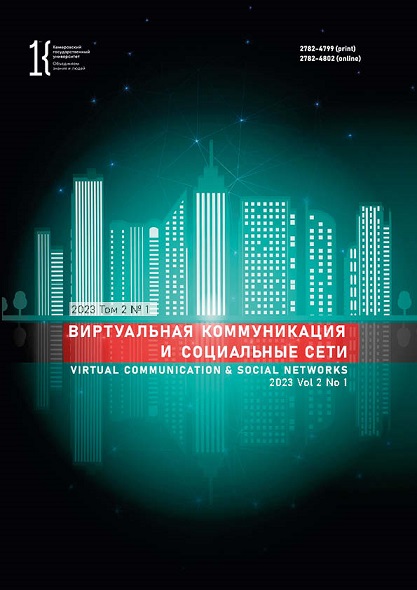Russian State Institute of Performing Arts
Kemerovo, Russian Federation
Kemerovo, Russian Federation
The authors used the method of quantitative and qualitative content analysis to study the online discourse of students in order to classify the elements of the commentary text. The analysis revealed certain cases, patterns, and phenomena that could be described as regular. The research featured several communities in the VKontakte social network connected with the Kemerovo State University. The online discourse demonstrated some linguistic peculiarities. The main discussion topics differed in values, judgments, emotional tone, creativity, and self-expression: academic process, life management, relationships (friendship, love, and family), health, existential issues (social role and future), and social criticism. The functions involved identification, information, affiliation, psychotherapy, and creativity. By learning the features of online communication, academic staff can develop effective and consistent communication with students. The informal linguistic environment of social nets contains extralinguistic factors that manifest themselves in online discourse and reveals the ideology of young people, their values, attitudes, and opinions on important matters.
discourse, discourse practice, comments, communication processes, virtual student communities, VKontakte
1. Bazhalkina N. S. To the problem of different approaches to the discourse analysis in modern linguistics. Vestnik Kemerovskogo gosudarstvennogo universiteta, 2016, (1), 156-160. (In Russ.)] https://elibrary.ru/vqsvvh
2. Bokaeva A. N., Nurseitova Kh. Kh. To definition of concept "discourse". Lingua mobilis, 2012, (1): 19-23. (In Russ.)] https://elibrary.ru/tigybb]
3. Bocharov V. Yu. Discourse analysis of the American working youth communities on the social network Reddit. Semioticheskie issledovanija. Semiotic studies, 2021, 1(1): 100-113. (In Russ.)] https://doi.org/10.18287/2782-2966-2021-1-1-100-113
4. Karasik V. I. Institutional discourse structure. Verbal communication problems, ed. Sirotinina O. V. Saratov: SGU, 2000, 25-33. (In Russ.)] https://elibrary.ru/xrpbvz
5. Karaulov Yu. N., Petrov V. V. From text grammar to cognitive discourse theory. In: Dijk T. A. van. Language. Cognition. Communication. Blagoveshchensk: Blagoveshchensk Humanitarian College named after Baudouin de Courtenay, 2000, 5-11. (In Russ.)]
6. Nguyen T. M. T., Shcherbakov M. V. A method for Facebook users profile creating based on emotional feedback and text sentiment analysis. Izvestiya Volgogradskogo gosudarstvennogo tekhnicheskogo universiteta, 2017, (1): 73-78. (In Russ.)] https://elibrary.ru/xwzpdb
7. Rogova E. N., Yanitskiy L. S. Rreadiness for volunteering in student youth discourse in the COVID-19 pandemic. Professional Education in Russia and Abroad, 2020, (4): 40-47. (In Russ.)] https://elibrary.ru/zsvwvs
8. Tarshis E. Ya. Prospects for the development of the content analysis method. Sotsiologiya: metodologiya, metody, matematicheskie modeli, 2002, (15): 71-92. (In Russ.)] https://www.elibrary.ru/peyiot
9. Phillips L. J., Jorgensen M. W. Discourse analysis as theory and method. 2nd ed. Kharkov: Gumanitarnyy tsentr, 2008, 352. (In Russ.)]
10. Khasanova Z. S. Some remarks on the issue of professional discourse separation criteria. Current Issues in Philology and Pedagogical Linguistics, 2014, (16): 268-278. (In Russ.)] https://elibrary.ru/spdfgh
11. Chernyavskaya V. E. Discourse of power and power of discourse: problems of speech influence. 3rd ed. Moscow: Flinta, 2017, 128. (In Russ.)]
12. Shapinskaya E. N. To the methodology of cultural studies: discourse analysis. Culture of culture, 2017, (2). (In Russ.)] URL: http://cult-cult.ru/to-the-methodology-of-cultural-studies-discourse-analysis/ (accessed 28 Oct 2022). https://elibrary.ru/ypqelj
13. Fairclough N. Language and power. London-NY: Longman, 1989, 259.

















